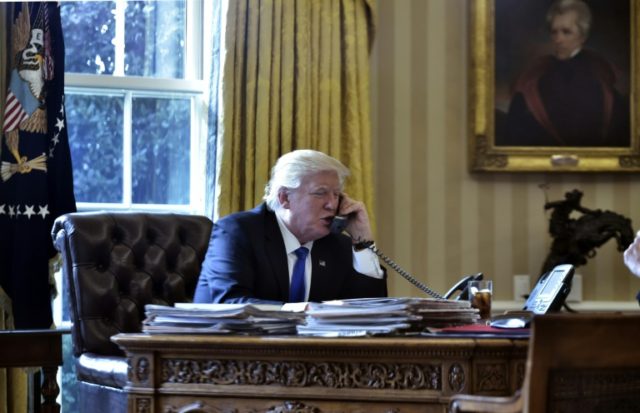President Donald Trump in his first phone call with Russian President Vladimir Putin denounced a treaty that caps U.S. and Russian deployment of nuclear warheads, according to a report.
Trump told Putin that the treaty, known as New START, was one of several bad deals negotiated by the Obama administration, according to a report by Reuters.
Unnamed sources said that Trump did not know what the treaty was, and had paused to ask his aides in an aside what it was, according to the report. White House Press Secretary Sean Spicer told reporters on Thursday that Trump understood the topic, but had wanted an opinion from an aide.
“It wasn’t like he didn’t know what was being said. He wanted an opinion on something,” Spicer said.
The treaty requires Russia and the United States to lower the number of deployed strategic nuclear warheads to 1,550 or less by 2018. It also limits deployed land- and submarine-based missiles, and nuclear-capable bombers.
In the phone call, Putin suggested extending New START, which is set to expire in 2021, the sources told Reuters.
Trump had criticized the treaty during a 2016 presidential debate, saying Russia had “outsmarted” the U.S. with former Secretary of State Hillary Clinton. Critics view the agreement as one-sided, requiring deep cuts in the U.S. nuclear arsenal and abandoning missile defense in Europe.
Trump had also tweeted, as president-elect, “The United States must greatly strengthen and expand its nuclear capability until such time as the world comes to its senses regarding nukes.”
Supporters of the treaty argue that the end of the treaty could lead to a new arms race.
“New START has unquestionably made our country safer, an opinion widely shared by national security experts on both sides of the aisle,” Democratic Sen. Jeanne Shaheen (NH) said in a statement.
A mutual agreement can extend the treaty’s provisions for another five years.
The original agreement, known as START, was renewed in 2010 by then-President Obama, and went into effect in 2011, according to CNN.
It aims to cut the number of nuclear weapons that the U.S. and Russia could deploy by about one-third. It would limit a maximum of 700 deployed intercontinental ballistic missiles, submarines and bombers, and a total of 1,500 warheads.

COMMENTS
Please let us know if you're having issues with commenting.